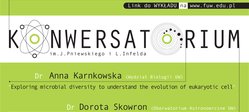
The Jerzy Pniewski and Leopold Infeld Colloquium FUW
dr Anna Karnkowska, Exploring microbial diversity to understand the evolution of eukaryotic cell
dr Dorota Skowron, A three-dimensional map of the Milky Way based on classical Cepheids
Dec. 21, 2020, 4:30 p.m.
on-line
The Jerzy Pniewski and Leopold Infeld Colloquium of the Faculty of Physics will be held on Monday, December 21, 4.30 PM. This time we will listen to lectures by winners (ex aequo) of the professor Stefan Pieńkowski prize:
- dr Anna Karnkowska (Faculty of Biology, University of Warsaw), "Exploring microbial diversity to understand the evolution of eukaryotic cell"
- dr Dorota Skowron (Astronomical Observatory UW), "A three-dimensional map of the Milky Way based on classical Cepheids"
The Professor Stefan Pieńkowski Award was established in 2004 for commemorating Professor Stefan Pieńkowski as the creator of the Warsaw physics school. The initiator and main founder of the award is Marek Maria Pieńkowski, PhD, acting through the Marek Maria Pieńkowski Foundation. Co-founder of the prize is Kosciuszko Foundation. The prize is awarded by the Chapter, chaired by the Director of the Institute of Experimental Physics at Faculty of Physics, University of Warsaw.
You are welcome to join the meeting 15-30 minutes before the Colloquium to talk or chat in an informal atmosphere.
Link: https://us02web.zoom.us/j/93881687598?pwd=UmFhVUdVSXhnQ2tIVVozNmowSUNtZz09
Meeting ID: 938 8168 7598
Passcode: prv316
With best regards,
Barbara Badełek
Jan Chwedeńczuk
Jan Kalinowski
Jan Suffczyński
dr Anna Karnkowska (Wydział Biologii UW)
"Exploring microbial diversity to understand the evolution of eukaryotic cell"
The emergence of eukaryotes, cells with organelles such as nucleus and mitochondria
or plastids, had a revolutionary impact on the subsequent history of life, leading
to the evolution of complex multicellular organisms. I will discuss the endosymbiotic
origin of mitochondria and plastids from bacteria, and their subsequent evolution.
Finally, I will focus on our discovery of a unicellular organism Monocercomonoides,
the first known eukaryote with no mitochondrion. Investigation of Monocercomonoides
allowed us to understand how endosymbiosis can be undone and how this affects the
cellular complexity.
dr Dorota Skowron (Obserwatorium Astronomiczne UW)
"A three-dimensional map of the Milky Way based on classical Cepheids"
We know that the Milky Way is a spiral galaxy, but methods used to describe it in more
detail have been indirect and based on various assumptions. This, combined with the fact
that we live within the disk and observe it through clouds of gas and dust, makes it
very difficult to make a precise map of our Galaxy. However, there is a class of young
variable supergiant stars, called classical Cepheids, to which we can measure distances
with great accuracy. I will show how we used a large sample of these stars to create
a new, detailed map of the Milky Way in three dimensions, and what they can tell us
about the recent history of our Galaxy.

